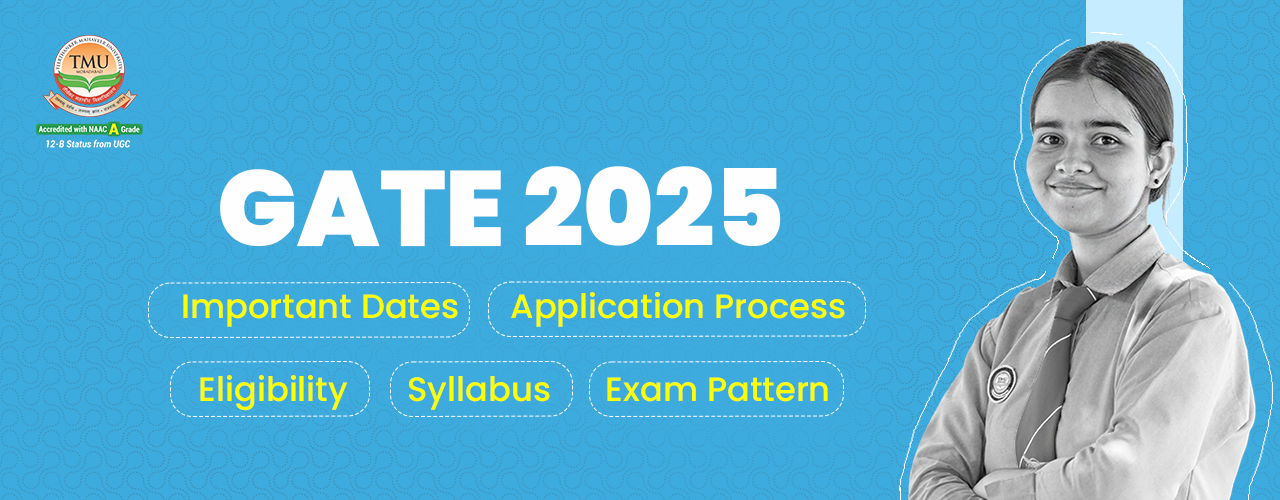GATE 2025: Important Dates, Eligibility, Application Process, Syllabus And Exam Pattern
Table of Contents
The GATE Exam 2025 is a national-level entrance examination primarily conducted for admission to postgraduate programs (M.E., M.Tech, PhD) in engineering, technology, architecture, and science. It is jointly organised by the Indian Institute of Science (IISc) and seven Indian Institutes of Technology (IITs). The GATE score is also widely used by India's public sector undertakings (PSUs) to recruit candidates for various positions.
The GATE (Graduate Aptitude Test in Engineering) exam ranks among the top 10 toughest exams globally for several reasons, including the presence of highly challenging tests like the Gaokao, UPSC Civil Services Examination, and CFA.
Key Features of the GATE Exam:
- Purpose: Admission to postgraduate programs and PSU recruitment.
- Eligibility: Typically final-year undergraduate students and graduates in engineering, technology, architecture, and related science disciplines.
- Subjects: Covers a wide range of disciplines including engineering (like civil, mechanical, electrical), sciences (like physics, chemistry), and humanities.
- Exam Format: A computer-based test (CBT) consisting of multiple-choice questions (MCQs) and numerical answer type (NAT) questions.
- Score Validity: GATE scores are valid for three years.
- Significance: High scores can open doors to prestigious institutes like IITs, IISc, and top government jobs.
GATE 2025 Information Brochure
The GATE 2025 Information Brochure is now available.
You can download it directly from the official GATE 2025 website:
- GATE 2025 Website: https://gate2025.iitr.ac.in/
The brochure contains essential details about the exam, including:
- Exam pattern
- Syllabus
- Eligibility criteria
- Application process
- Important dates
- Admit card
- Result
GATE Exam Important Dates
GATE 2025 will be conducted by IIT Roorkee
Key Dates:
- Application Start Date: August 24, 2024
- Last Date to Apply (without late fee): September 26, 2024
- Last Date to Apply (with late fee): October 7, 2024
- Admit Card Release: January 2, 2025
- Exam Dates: February 1, 2, 15, and 16, 2025
- Result Declaration: March 19, 2025
Note: These are the key dates for GATE 2025. For the most accurate and up-to-date information, always refer to the official GATE website: GATE 2025
Teerthanker Mahaveer University
Apply for Admission
Click Here To Apply for Admission
GATE Full Form
GATE full form is a Graduate Aptitude Test in Engineering. It's a national-level examination conducted in India to test the comprehensive understanding of undergraduate subjects in engineering and science.
What is the GATE Exam?
GATE stands for Graduate Aptitude Test in Engineering. It's a national-level examination conducted in India that primarily tests the comprehensive understanding of undergraduate subjects in engineering and sciences.
What is GATE Used For?
- Admission to Postgraduate Programs: A good GATE score opens doors to prestigious institutes like IITs, NITs, IIITs, and other universities for Master's programs (M.E., M.Tech., M.Arch.) and direct Ph.D. programs.
- Recruitment by Public Sector Undertakings (PSUs): Many PSUs like ONGC, NTPC, GAIL, and others use GATE scores for recruiting engineers at entry-level positions.
How to Crack the GATE exam
Cracking the GATE exam requires a strategic approach, consistent effort, and a clear understanding of the exam pattern. Here's a comprehensive guide:
Understand the Exam Pattern
- Familiarize yourself with the exam structure, marking scheme, and negative marking.
- Analyze previous year's question papers to get an idea of the question types and difficulty level.
Build a Strong Foundation
- Strengthen your undergraduate concepts.
- Focus on core subjects and their applications.
Create a Study Plan
- Develop a structured study plan covering all subjects and topics.
- Allocate specific time for each subject based on its weightage and your strengths.
- Prioritize topics based on difficulty level and importance.
Choose the Right Study Material
- Refer to standard textbooks and reputable coaching institutes' materials.
- Select materials that align with the GATE syllabus.
Practice Regularly
- Solve previous year question papers to understand the exam pattern.
- Attempt mock tests to assess your preparation level.
- Analyze your performance and identify areas for improvement.
Time Management
- Develop effective time management skills during the exam.
- Practice solving questions within the given time frame.
Short Notes and Revision
- Create concise notes for quick revision.
- Regularly revise important formulas, concepts, and theories.
Stay Consistent
- Dedicate consistent study hours to cover the entire syllabus.
- Maintain a balance between study and breaks.
Take Care of Your Health
- Prioritize physical and mental well-being.
- Get enough sleep, exercise regularly, and eat healthy food.
Seek Guidance
- Join a coaching institute or online course for structured guidance.
- Discuss doubts with peers or mentors.
Develop a Positive Mindset
- Believe in your abilities and stay motivated.
- Develop a positive attitude towards challenges.
Additional Tips
- Join study groups to discuss concepts and solve problems together.
- Utilize online resources and forums for clarification of doubts.
- Take short breaks during study sessions to avoid burnout.
- Reward yourself for achieving milestones to stay motivated.
Remember: Consistency, hard work, and smart study strategies are key to success in the GATE exam.
GATE Exam Syllabus
The GATE syllabus varies depending on the specific paper you choose. There are numerous papers, each catering to a different engineering discipline.
General Structure of GATE Syllabus
Generally, a GATE paper consists of three main sections:
- General Aptitude (GA): This section is common to all papers and tests basic numerical ability, verbal ability, and reasoning.
- Engineering Mathematics: This section covers undergraduate-level mathematics topics.
- Core Subjects: This section focuses on the specific engineering discipline you have chosen.
Where to Find the Detailed Syllabus
To get the exact syllabus for your desired GATE paper, please visit the official GATE website:
GATE CSE Syllabus
The GATE CS/IT syllabus is quite extensive, covering a wide range of computer science fundamentals. The following sections will provide a comprehensive overview:
Section | Topics |
General Aptitude (GA) | Verbal Ability, Numerical Ability, Reasoning |
Engineering Mathematics | Linear Algebra, Calculus, Probability and Statistics, Discrete Mathematics |
Core Computer Science Subjects | Digital Logic, Computer Organization and Architecture, Programming and Data Structures, Algorithms, Theory of Computation, Compiler Design, Operating System, Databases, Computer Networks |
Note:
- The specific weightage of each section may vary from year to year.
- For the most accurate and up-to-date information, always refer to the official GATE website.
GATE ECE Syllabus
The GATE ECE syllabus is divided into three main sections:
Section | Topics |
General Aptitude (GA) | Verbal Ability, Numerical Ability, Reasoning |
Engineering Mathematics | Linear Algebra, Calculus, Probability and Statistics, Differential Equations |
Core Electronics and Communication Engineering Subjects | Networks and Systems, Electronic Devices, Analog Circuits, Digital Circuits, Control Systems, Communication Systems, Electromagnetics, Signal Processing |
GATE ME Syllabus
The GATE (Graduate Aptitude Test in Engineering) for Mechanical Engineering (ME) covers a wide range of topics. Here's a breakdown of the syllabus:
Section | Topics |
Engineering Mathematics | Linear Algebra, Calculus, Differential Equations, Probability and Statistics |
General Aptitude | Verbal Ability and Comprehension, Numerical Ability |
Mechanical Engineering | Applied Mechanics, Theory of Machines, Machine Design, Dynamics of Machines, Vibrations, Thermodynamics, Heat Transfer, Fluid Mechanics, Manufacturing Processes, Materials Science, Industrial Engineering and Operations Research |
GATE EE Syllabus
The GATE EE (Electrical Engineering) Syllabus is vast and comprehensive, covering a wide range of topics from undergraduate-level electrical engineering. Here's a breakdown of the major sections:
Section | Topics |
General Aptitude (GA) | Verbal Ability, Numerical Ability |
Engineering Mathematics | Linear Algebra, Calculus, Probability and Statistics, Numerical Methods |
Electrical Engineering | Network Theory, Electromagnetic Fields, Signals and Systems, Control Systems, Power Systems, Electrical Machines, Power Electronics, Digital Electronics, Microprocessors and Microcontrollers |
GATE CE Syllabus
The GATE Civil Engineering syllabus is divided into two main sections: General Aptitude and Technical.
Section | Topics |
General Aptitude | Verbal Ability, Numerical Ability, Data Interpretation, Logical Reasoning |
Engineering Mathematics | Linear Algebra, Calculus, Differential Equations, Probability and Statistics, Numerical Methods |
Structural Engineering | Mechanics of Structures, Structural Analysis, Design of Concrete Structures, Design of Steel Structures |
Geotechnical Engineering | Soil Mechanics, Foundation Engineering |
Water Resources Engineering | Fluid Mechanics and Hydraulic Machinery, Hydrology, Water Resources Planning and Management, Irrigation and Drainage |
Environmental Engineering | Environmental Chemistry, Water and Wastewater Treatment, Air Pollution Control, Solid Waste Management |
Transportation Engineering | Highway Engineering, Traffic Engineering, Railway Engineering, Airport Planning |
Geomatics Engineering | Surveying, Remote Sensing, Geographic Information Systems (GIS) |
Note: The specific weightage of each section and topic may vary slightly from year to year. It's recommended to refer to the official GATE brochure for the most accurate and up-to-date information.
GATE Exam Pattern
GATE is a computer-based test (CBT) with a duration of 3 hours. Below is the GATE Exam pattern for 2025:
Exam Structure
- Total Marks: 100
- Number of Questions: 65
Sections
- General Aptitude (GA): 10 questions, 15 marks
- Engineering Mathematics: Varies by paper (optional in some papers)
- Subject-Specific Questions: The remaining questions
Question Types
- Multiple Choice Questions (MCQs): Single correct answer from given options.
- Numerical Answer Type (NAT): The answer is entered directly using the virtual keyboard.
Marking Scheme
- MCQs: +1 for the correct answer, -1/3 or -2/3 negative marking.
- NAT: +1 or +2 for correct answer, no negative marking.
Note: The exact structure and marking scheme might vary slightly between different GATE papers.
GATE Exam Cut-Off Marks
The GATE cut-off marks vary significantly based on factors like:
- Paper: Each engineering discipline has its cut-off.
- Category: General, OBC, SC, ST, and PwD categories have different cut-offs.
- Year: Cut-offs fluctuate annually based on exam difficulty and number of candidates.
Paper | Category | Approximate Cut-Off |
CS/IT | General | 25-35 |
CS/IT | OBC | 22-30 |
CS/IT | SC/ST | 18-25 |
EE | General | 28-32 |
EE | OBC | 25-28 |
EE | SC/ST | 20-23 |
ME | General | 27-30 |
ME | OBC | 24-27 |
ME | SC/ST | 20-22 |
CE | General | 26-29 |
CE | OBC | 23-26 |
CE | SC/ST | 19-21 |
Note: These are approximate values and can vary significantly. The actual cut-offs can be higher or lower depending on the factors mentioned above.
To get the most accurate and up-to-date cut-off marks, it's essential to refer to the official GATE website after the results are announced.
GATE Exam Application Form
The application process for GATE 2025 will be starting from 24th August 2024
Important Dates:
- Application Start Date: August 24, 2024
- Last Date to Apply (without late fee): September 26, 2024
How to Apply:
- Visit the official GATE website: GATE 2025
- Register yourself on the portal.
- Fill in the application form with personal, academic, and contact details.
- Choose your desired papers.
- Upload required documents (photo, signature, category certificate, etc.).
- Pay the application fee.
- Submit the application form.
Remember to keep a printout of the application form and fee receipt for future reference.
GATE Two-Paper Combinations
The GATE exam allows candidates to choose two papers from a predefined set of combinations, depending on their educational background and the field of study they wish to pursue. This option is particularly useful for candidates who want to appear for interdisciplinary studies or wish to demonstrate proficiency in multiple areas.
Yes, you can appear for two papers in the GATE exam. However, there are specific combinations allowed.
How it Works:
- Primary Paper: This is usually related to your undergraduate degree.
- Secondary Paper: You can choose a related paper as your secondary option.
Benefits of Two Papers:
- Increased chances of admission: A good score in either paper can improve your chances of getting into desired programs.
- Broader career options: Having scored in two papers can open up more job opportunities.
Here's a table summarising the allowed two-paper combinations for the GATE exam. These combinations are designed to provide flexibility and accommodate interdisciplinary studies.
Primary Paper | Allowed second-paper combinations |
Civil Engineering (CE) | Environmental Science and Engineering (ES), Geology and Geophysics (GG) |
Mechanical Engineering (ME) | Engineering Sciences (XE) |
Electrical Engineering (EE) | Electrical Engineering and Instrumentation (EI) |
Chemical Engineering (CH) | Chemistry (CY), Biotechnology (BT) |
Computer Science and Information Technology (CS) | Mathematics (MA), Engineering Sciences (XE) |
Mathematics (MA) | Statistics (ST) |
Physics (PH) | Mathematics (MA), Engineering Sciences (XE) |
Biotechnology (BT) | Chemistry (CY), Life Sciences (XL) |
Engineering Sciences (XE) | Mechanical Engineering (ME), Civil Engineering (CE), Physics (PH), Chemistry (CY) |
Life Sciences (XL) | Chemistry (CY), Biotechnology (BT) |
The combinations allowed can change from year to year, and the official list is usually released closer to the application start date.
How to Find the Allowed Combinations:
- Check the Official GATE Website: The GATE conducting institute (IIT Roorkee for GATE 2025) will release the complete list of allowed combinations on their official website.
- Look for Updates: Keep an eye on the GATE website and other reliable sources for any announcements regarding two-paper combinations.
Conclusion
The GATE (Graduate Aptitude Test in Engineering) 2025 presents a significant opportunity for engineering and science graduates seeking to advance their academic and professional careers. Conducted by the Indian Institute of Science (IISc) and seven Indian Institutes of Technology (IITs), this national-level examination plays a crucial role in facilitating admissions to postgraduate programs and providing entry-level positions in Public Sector Undertakings (PSUs).
Whether you aim to secure a place in a top engineering institute or embark on a career with leading PSUs, excelling in GATE 2025 requires dedication, preparation, and a thorough understanding of the exam format. With consistent effort and strategic planning, achieving a high score in GATE can open doors to a rewarding future in the field of engineering and technology.
Frequently Asked Questions (FAQs)
Q1: What is the GATE exam used for?
Ans: The GATE exam is primarily used for two main purposes:
- Admission to Postgraduate Programs: A good GATE score opens doors to prestigious institutes like IITs, NITs, IIITs, and other universities for Master's programs (M.E., M.Tech., M.Arch.) and direct Ph.D. programs.
- Recruitment by Public Sector Undertakings (PSUs): Many PSUs like ONGC, NTPC, GAIL, and others use GATE scores for recruiting engineers at entry-level positions.
Q2: Who is eligible for GATE exam?
Ans: Eligibility for GATE Exam:
- Currently in the 3rd or higher year of an undergraduate degree program in engineering, technology, architecture, science, commerce, or arts.
- Completed a government-approved degree program in engineering, technology, architecture, science, commerce, or arts.
Note: There is no age limit for appearing in the GATE exam.
Q3: Is GATE harder than jee?
Ans: Yes, GATE is generally considered harder than JEE.
- GATE focuses on an in-depth understanding of undergraduate engineering concepts, requiring a higher level of problem-solving skills.
- JEE primarily tests concepts from 11th and 12th-grade physics, chemistry, and mathematics.
However, both exams are highly competitive and demand dedicated preparation.
Q4: How many attempts for GATE?
Ans: There is no limit to the number of times you can attempt the GATE exam. You can take it as many times as you wish.















